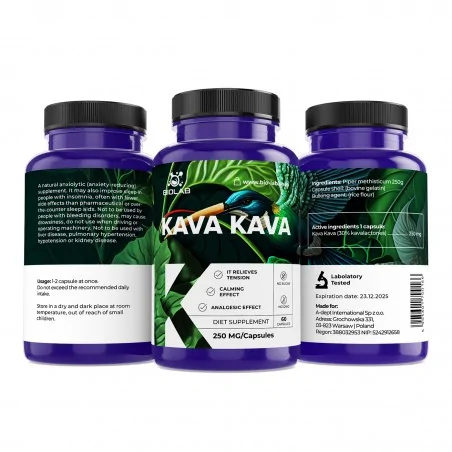
KAVA KAVA
Product code:
Buy 3 and get 3% discount
Buy 5 and get 5% discount


Product code:
























Kava (scientific name Piper methysticum) is a tall shrub of the pepper family that grows in the Pacific Islands. Pacific Islanders have traditionally used Kava in ceremonies to induce a state of relaxation. The name Kava means "bitter" in the Tongan language.
In addition to recreational and ceremonial uses, Kava is commonly used in alternative medicine as a natural anxiolytic (anxiety reducer). It can also improve sleep in people with insomnia, often with fewer side effects than pharmaceutical or over-the-counter sleep aids. https://www.fao.org/3/i5770e/i5770e.pdf
https://www.cochranelibrary.com/cdsr/doi/10.1002/14651858.CD003383/full
According to a 2002 research review of seven clinical trials and 645 people, kava was deemed "an effective treatment option for symptomatic anxiety" even though the effect was considered "small" by the researchers. A 2013 randomized controlled trial found Kava to be effective in treating generalized anxiety disorder. The results showed a significant reduction in anxiety, with 26% of participants in the Kava group experiencing remission of their anxiety symptoms at the end of the study https://doi.org/10.1097/JCP.0b013e318291be67
Most research on the use of kava for insomnia is limited to animal studies. It is believed that a specific type of kavalactone, called kevain, may provide the drug's sedative effect. Of the available human studies, one small study from Germany showed that people taking 200 milligrams of Kava extract daily experienced significant relief from insomnia after 14 days. https://doi.org/10.1016/s0165-0327%2802%2900238-0
In March 2002, the U.S. Food and Drug Administration (FDA) warned consumers and healthcare professionals of the risk of liver damage associated with kava use.11 Case reports have linked kava to liver toxicity, including hepatitis, cirrhosis, liver failure, and even death. Many of these cases were related to pre-existing liver disease, excessive doses of Kava, and heavy alcohol consumption. It is still unclear whether the liver toxicity was the result of kavalactones, impurities found in low-quality extracts, or organic solvents (such as acetone or ethanol) used to make Kava extracts and supplements.
The effect of Kava on the neurological system is poorly understood. As such, it should not be used in people with clinical depression, bipolar disorder or schizophrenia. Kava should be avoided in people with Parkinson's disease as it can potentially worsen symptoms. Kava may interfere with blood clotting. It should not be used by people with bleeding disorders. You should also stop using Kava at least two weeks before surgery to avoid excessive bleeding. Kava can cause drowsiness and impair judgment, reflexes, and visual acuity. Do not use Kava if you plan to drive a car or operate heavy machinery. Kava should be avoided in people with alcoholism, liver disease, pulmonary hypertension, low blood pressure (hypotension), or kidney disease.

Your review appreciation cannot be sent
Report comment
Report sent
Your report cannot be sent
Write your review
Review sent
Your review cannot be sent
Customers who bought this product also bought:
TUDCA 250mg/capsules
EXTREME PUMP 2 225mg
FISETIN 100mg/capsule
SHREDDED AF 300mg
DIM 100mg
OSTARINE 60tab/10mg
NO MERCY PRE-WORKOUT MIX...
Różeniec górski 300mg/kapsulka
Newsletter
SIGN UP AND STAY UP TO DATE!
We specialize in wholesale and retail supply of high quality peptides.
Category
Our company
Add to wishlist
((title))
Sign in
You need to be logged in to save products in your wishlist.